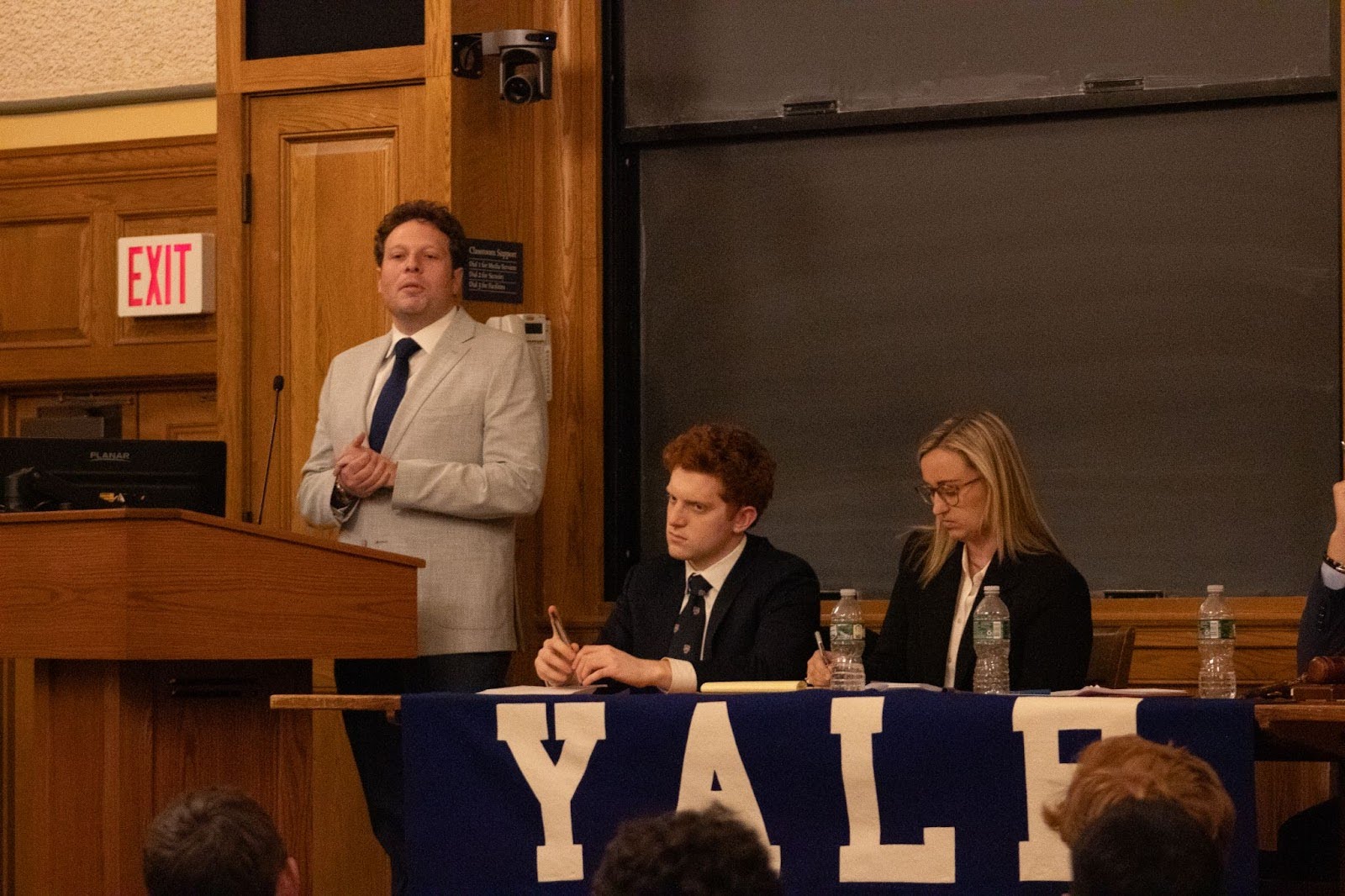YPU spars over the fate of cultural elites in first joint debate of the year
Two journalists, Ross Barkan and Emily Jashinsky, argued on whether or not to reject the cultural elites of society.

Courtesy of Bryce Sauvie
The Yale Political Union hosted its first two-speaker debate of the year, featuring Ross Barkan — a democratic socialist, novelist and New York Times guest columnist — who preached his negative stance on the resolution “Resolved: Reject Our Cultural Elites,” and Emily Jashinsky, a D.C. Correspondent at UnHerd magazine and a conservative culture journalist who debated in the affirmative.
Barkan took the floor of the union first, delivering a defense of cultural elites and their role in shaping society while also criticizing them. Barkan’s speech wove together media critique, historical analysis and reflections on contemporary cultural institutions to challenge the notion that elites should be outright rejected, arguing instead for their reform and reinvigoration.
“I could stand here for an hour or more and barrage you with various facts of the failures of our so-called elites over the last 30 years,” Barkan admitted, acknowledging widespread disillusionment with elite institutions.
He cited examples ranging from the 2008 financial crisis to the Iraq War and the rise of reality television figures in politics as evidence of elite mismanagement. However, he cautioned against a total rejection of these institutions, warning that such a path could lead to intellectual and cultural stagnation.
Barken also contested the conservative critique of cultural elites with the left’s internal debates. He pointed out that, while conservatives often call for the destruction of elite institutions, the far left seeks to reshape them radically.
“The left wants to rip Socrates and Shakespeare from the classrooms, while the right wants to burn down the classroom altogether,” Barkan said.
Barkan then focused heavily on what he termed “macro-culture,” lamenting the decline of risk-taking in literature, the dominance of superhero franchises in Hollywood and the commodification of music by streaming algorithms. He argued that universities, publishing houses and news organizations — despite their flaws — remain essential for sustaining intellectual life and cultural heritage. Without them, he warned, future generations risk losing access to the great works and ideas that have shaped civilization.
Despite his critiques, Barkan did not call for blind allegiance to the elite institutions he defended. Instead, he advocated for their revitalization, urging those frustrated with the current state of affairs to engage with and reform these institutions rather than abandon them.
“Let us then reform our cultural elites. Let’s save them. Because if we do not, we are staring down an intellectually and spiritually barren future, one of greater rancor and terrifying ignorance,” Barkan said.
Following Barkan’s speech, Jashinsky took to the floor to deliver her opposing stance to the resolution.
Jashinsky delivered a scathing critique of America’s cultural and economic elites, arguing that unchecked greed and an absence of shame have eroded democratic accountability.
Framing her speech around the failures of contemporary leadership, Jashinsky drew parallels between political, corporate and media institutions that she argued prioritize self-preservation over the public good.
“When a ship veers off course, you do not accept the leadership just because the ship is moving,” she remarked, emphasizing the need for a recalibration of values.
In agreement with Barkan’s negative stance, Alessandra Pappalardi ’27 argued that “we need to be honest with ourselves, especially as Yale students,” that elitism, in some form, is inevitable.
“The real question is not how to eliminate elites, but how to ensure that the systems they inhabit are porous and accountable for everyone else,” said Pappalardi.
She also argued that, while the failure of institutions “to meet demand while establishing elitism is real,” dismantling those institutions “doesn’t get us closer to justice.”
Also in agreement with Barkan, Mór Szepesi ’27 argued that “every society has had some sort of hierarchy, some sort of elite,” and that the alternative would be “chaos.”
“The issue is not that we have elites, it is the makeup of elites,” said Szepesi. “Elites drive national image and national pride, and that is how people get meaning … we measure our lives by looking at others and try to glean how we live in comparison. Human nature is fundamentally competitive.”
After the debate, the affirmative prevailed 28-11-2 on “Resolved: Reject the Cultural Elite.”







